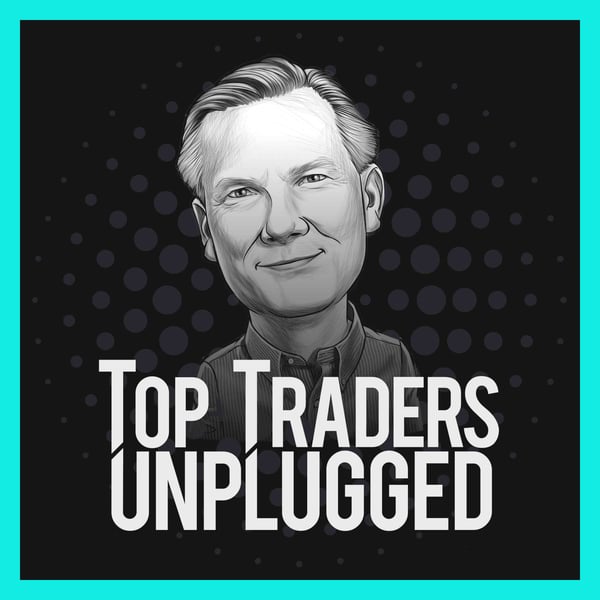TTU22: The Most Important Question Investors Should be Asking ft. Nigol Koulajian of Quest Partners – 2of2
Top Traders Unplugged
Niels Kaastrup-Larsen
4.8 • 670 Ratings
🗓️ 14 August 2014
⏱️ 73 minutes
🧾️ Download transcript
Summary
Did you know that a meditation practice can help you be a better investor?
In this episode we discuss our common lessons that we ask all Top Traders, but we dive deep into why Nigol thinks differently about CTA issues. Growing up in war-torn Lebanon shifts the filters he uses to see the markets. We all have filters but in this episode you will learn what perspective he takes on the markets that may, or may not, support his market philosophy.
Welcome back to the second half of our interview with Nigol Koulajian.
-----
50 YEARS OF TREND FOLLOWING BOOK AND BEHIND-THE-SCENES VIDEO FOR ACCREDITED INVESTORS - CLICK HERE
In This Episode, You’ll Learn:
- How growing up in war torn Lebanon influences the way Nigol filters market decisions
- The challenging nature of a market injected with federal liquidity
- Nigol’s strategies for selecting position sizing
- Drawdown expectations of Quest Partners
- How Quest works to maintain a balance in the working environment and how busy the team stays
- How Nigol manages emotional turmoil of drawdowns and how he projects this calmness upon his investors
- The few things that Nigol predicts would shake their strategy
- How to listen to clients and use their advice in a way that serves them, even if you don’t implement exactly what they’re saying
- Why mathematician optimization can adversely effect the strength of your CTA strategy
- How Nigol expects to know if a model is working or not
- The importance of using math as little as possible despite the systematic approach to trading
- A fascinating perspective on why the CTA industry AUM has shifted to Europe
- The most important question investors should be asking: “How to price tail risk.”
- What it takes to build a firm and become the next Quest
- Learn all about Nigol’s daily meditation practice which he credits as his top personal attribute to becoming a great trader
- The most challenging thing about being a CTA for Nigol (A: Fishing in a very small pond)
- Nigol’s biggest failure which occurred in 2009
-----
Follow Niels on Twitter, LinkedIn, YouTube or via the TTU website.
IT’s TRUE ? – most CIO’s read 50+ books each year – get your FREE copy of the Ultimate Guide to the Best Investment Books ever written here.
And you can get a free copy of my latest book “Ten Reasons to Add Trend Following to Your Portfolio” here.
Learn more about the Trend Barometer here.
Send your questions to [email protected]
And please share this episode with a like-minded friend and leave an honest Rating & Review on
Transcript
Click on a timestamp to play from that location
| 0:00.0 | You're listening to Top Traders Unplugged, episode number 022, where I continue my conversation with |
| 0:07.4 | Nicole Collagen, founder and CIO, of Quest Partners. This episode is sponsored by Saxo Bank and Swiss |
| 0:15.1 | Financial Services. Welcome back to Top Traders Unplugged, where the best traders in the world come to share their experiences, their successes, and their failures. |
| 0:24.5 | Let's rejoin the conversation with your host, veteran hedge fund manager, Niels Kastro Flandlarsen. This is complex stuff. |
| 0:40.3 | For you to explain this, this is not, you know, a lot of people will have difficulties |
| 0:48.3 | in sort of getting their head around these types of concepts because it's a little bit more than |
| 0:55.3 | traditional trend following you buy when the price move up and you sell when the price |
| 0:59.8 | move down and so on and so forth but what I wanted to ask you because you mentioned in |
| 1:04.8 | the beginning of our conversation that your upbringing in Lebanon actually |
| 1:10.3 | influenced the way you design your systems. |
| 1:13.6 | So now I want to try and bridge that gap between these very complex models that you just described |
| 1:19.6 | and your upbringing in an inherently unstable environment. |
| 1:24.6 | How does that work? |
| 1:31.3 | Thanks for the interesting question. Well, you see, we see the world based on our memory of what it's supposed to be like. |
| 1:40.3 | It means most people see the world based on their own filters of reality, not based on how it is. |
| 1:46.5 | Right. |
| 1:47.3 | Okay. |
| 1:48.2 | So I have filters. |
| 1:49.9 | People who grew up in New York and have never seen a war have a different type of filters. |
| 1:55.7 | Sure. |
| 1:59.1 | My filters, when I started out as a kid, my grandfather who basically lived in the Ottoman Empire, always warned me that, you know, always questioned the system. |
| 2:09.6 | Don't believe that a system which looks strong means that it's stable, that things can reverse at any point in time. |
... |
Please login to see the full transcript.
Disclaimer: The podcast and artwork embedded on this page are from Niels Kaastrup-Larsen, and are the property of its owner and not affiliated with or endorsed by Tapesearch.
Generated transcripts are the property of Niels Kaastrup-Larsen and are distributed freely under the Fair Use doctrine. Transcripts generated by Tapesearch are not guaranteed to be accurate.
Copyright © Tapesearch 2025.

